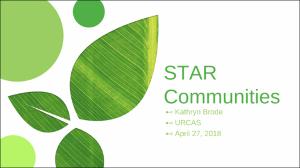Please use this identifier to cite or link to this item:
http://hdl.handle.net/10267/33455| Title: | STAR Communities |
| Authors: | Brode, Kathryn C. |
| Advisors: | Collins, Michael D. |
| Keywords: | Class of 2018;URCAS;Student research;2018 Spring;Biology, Department of |
| Issue Date: | 27-Apr-2018 |
| Abstract: | Sustainability Tools for Assessing and Rating Communities (STAR Community) is a program that municipal communities can join. The STAR Community program gives communities tools that allow them to become more environmentally sustainable. After an initial assessment, the community is scored on a points system and given a graded level of achievement. Evaluation measures are built environment; climate and energy; economy and jobs; education, arts, and community; equity and empowerment; health and safety; natural systems; and innovation. Within each evaluation measure are subcategories that are assigned a certain number of points, some being outcome points, and some being actions points. Communities are required to reapply with STAR Communities every few years, at which time, updated data are complied. In many cases, communities that failed certain areas or measures the last time they certified can gather data proving that they have made strides in becoming more sustainable. When a report is submitted, a STAR Community employee will perform an overview of the report, making sure that each measure was executed, giving each measure a failed, passed, overridden, or partial point status. Communities can then reevaluate their report before final submission. The STAR Community program serves to encourage municipalities to become environmentally sustainable. |
| Description: | Presentation by Kathryn Brode ('18) delivered at the Rhodes College Undergraduate Research and Creative Activity Symposium (URCAS). |
| URI: | http://hdl.handle.net/10267/33455 |
| Appears in Collections: | Undergraduate Research and Creative Activity Symposium |
Files in This Item:
| File | Description | Size | Format | |
|---|---|---|---|---|
| 201804_Brode_Kathryn_STAR_internship.pdf | 1.49 MB | Adobe PDF |  View/Open |
Items in DSpace are protected by copyright, with all rights reserved, unless otherwise indicated.